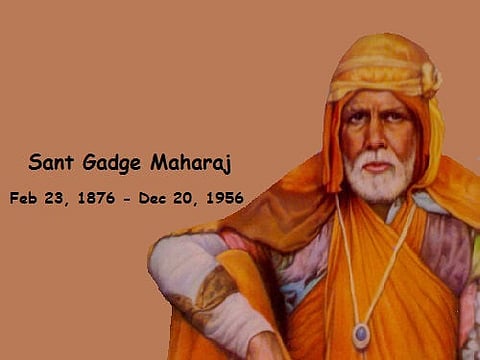
Maharashtra- There have been many saints in our country who devoted their lives to the emancipation of the poor and the oppressed, and Sant Gadge Baba is one of those in the tradition of Nanak, Kabir, Ravidas, Ghasidas, etc., who exemplified simple living and high thinking. On his 67th death anniversary, we try to shed light on how Gadge Baba was an exemplary saint.
Sant Gadge Baba, also known as Sant Gadge Maharaj, was a prominent saint and social reformer in Maharashtra, India. His full name was Deoram Gadge. He was born on February 23, 1876, in a small village called Shingnapur in Maharashtra. His early life was marked by poverty, and he had little formal education.
Gadge Baba went through a profound transformation after a series of personal experiences. Sant Gadge Baba worked tirelessly to address social issues such as untouchability, alcoholism, caste discrimination, and lack of sanitation. Though not highly educated due to a lack of formal schooling, he espoused the cause of education and encouraged the youth from his society to study. He opened hostels for people from the backward sections of society. He promoted the idea of cleanliness and hygiene in villages. Unlike the babas of today, who have a wide gap between what they preach and practice, Gadge practiced what he preached, leading a simple and austere life. He wore a simple loincloth and a small towel, traveling on foot from village to village to spread his message.
Sant Gadge Baba strongly opposed the practice of untouchability and worked towards the upliftment of the lower castes. He believed in the equality of all human beings. Sant Gadge Baba's life and teachings emphasize the values of simplicity, compassion, and selfless service to humanity. His contributions to social reform and his emphasis on cleanliness and equality have left a lasting impact on the cultural and social fabric of Maharashtra.
One of his significant initiatives was the "Clean Village" movement. He encouraged villagers to maintain cleanliness and hygiene in their surroundings. He emphasized the importance of sanitation and clean living conditions. It is said that he used to carry a broom whenever he went and used to clean the surroundings himself.
It's worth noting that individuals like Ambedkar and Sant Gadge Baba played complementary roles in addressing social issues, each contributing to the broader goal of creating a more just and equitable society in India. Their work has had a lasting impact on the country's social fabric and continues to influence discussions on social justice and equality. The influence of Ambedkar on Gadge is said to be the reason behind the great emphasis laid by Ambedkar on education – he used to say that even if it comes at the cost of the plate in which one eats food, one should not hesitate to get an education.
"You can always eat with your hands, but without education, life is incomplete." He used to cite the example of Ambedkar as an encouragement for people to pursue education. Ambedkarite intellectual Mangesh Dahiwale told the Mooknayak, "Once during a kirtan (sermon), Gadge Baba asked his followers if they had seen God, to which the followers replied in the negative. Then Baba told them to look behind and see God. Dr. Ambedkar was sitting behind the followers."
Dahiwale adds, "Ambedkar is also believed to have helped Sant Gadge Baba financially. Though Dr. Ambedkar refrained from meeting the sants, he was influenced by Gadge Baba and described him as the greatest servant of the people after Jyotiba Phule. In fact, Gadge Baba featured as himself in a film made on Jyotiba Phule, the inaugural shooting clap for which was given by Dr. Ambedkar."
It is a sheer coincidence that both the anti-caste crusaders died within two weeks of each other. It is said that after the son of Gadge Baba had died, he did not cry and took the death very nonchalantly, saying, "Everyone has to die; there is no point in crying for someone who has left." But when Dr. Ambedkar died on 6th December, he cried profusely and was grief-stricken for days, and on 20th December 1956, just two weeks later, he himself succumbed to grief and old age.
The Government of Maharashtra started the Sant Gadge Baba Gram Swachata Abhiyan project in 2000-01 in his honor. This program awards prizes to villagers who contribute to the cleanliness of the villages. In addition, the Government of India instituted a National Award for Sanitation and Water in his honor. The University of Amravati has also been named in his honor. The Government of Maharashtra formed a trust to preserve the more than 100 institutions, including 31 educational institutions founded by him. In 1998, the government of India released a postal stamp in his memory. On his 67th death anniversary, let us remember the great saint who carried the legacy of Kabir, Ravidas in the modern era.
Also Read-
You can also join our WhatsApp group to get premium and selected news of The Mooknayak on WhatsApp. Click here to join the WhatsApp group.